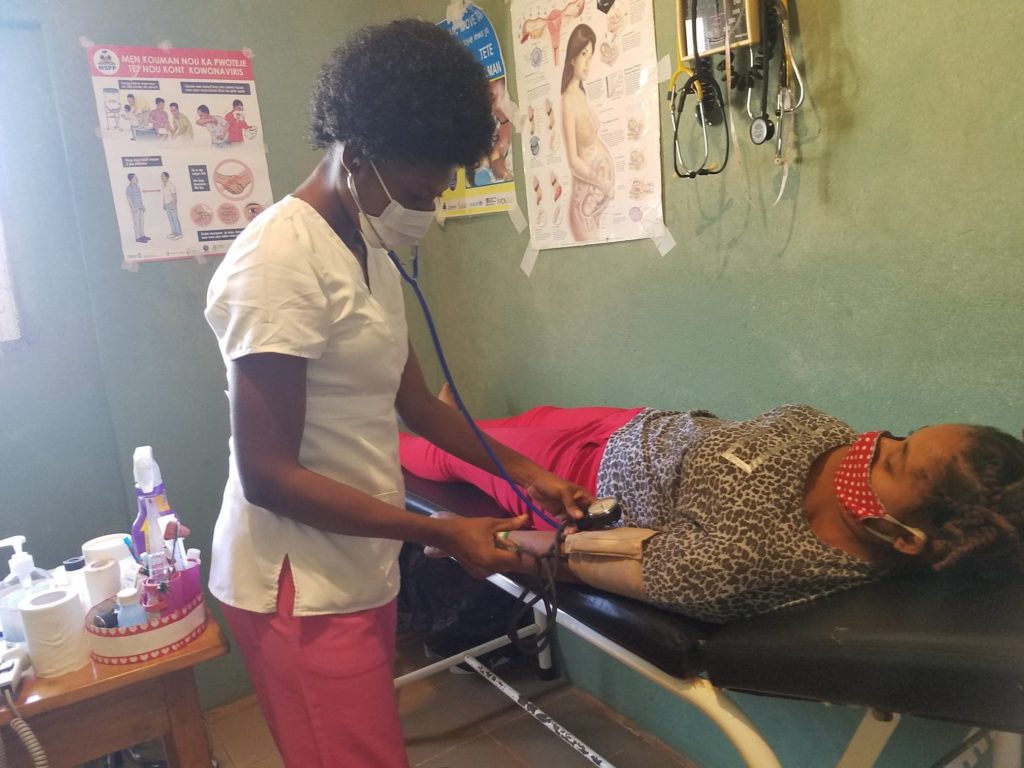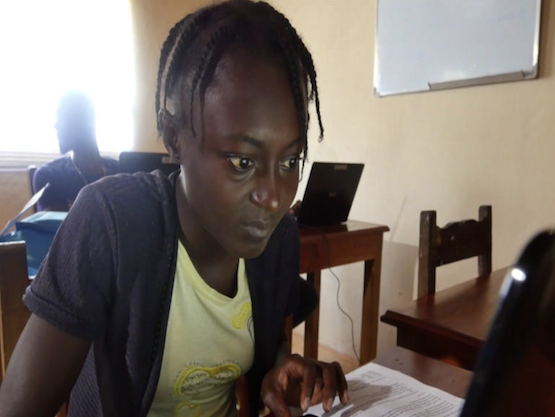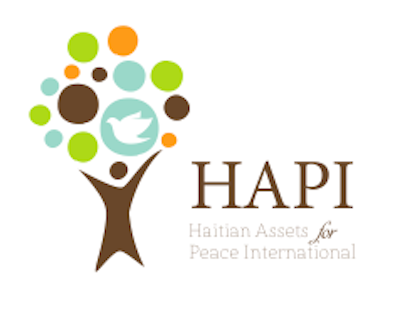What we do and why
Our core services and causes

HAPIGro
‘Pass-the-gift’ goat raising teaches youth practical skills in animal husbandry and responsibility to prepare for their future. Proceeds of ‘kid’ sales will help them pay tuition and contribute to food security.

HAPIHealth
Felisane Health Center offers community services including maternal, pediatric, urgent, mobile visits to disabled persons and dental care delivered by HAPI’s qualified health professionals .

HAPITech
The first vocational facility in Mizak (Musac) Haiti. Our teachers offer courses in English-Second- Language (ESL), computer literacy, computer trouble-shooting, ceramic tiling and electrical.
Empower Women
Women are change agents
Why
WOMEN … gender equality and women’s empowerment is the CORNERSTONE of HAPI.
Ending discrimination in all it’s forms is the RIGHT thing to do! Gender equality ends discrimination and gives women and girls a VOICE and a CHOICE in their own affairs. It opens the doors to opportunity to achieve their God-given potential in education, jobs, health, and society.
Empowered girls and women are key to breaking the cycle of poverty for families around the world. Empowered, educated girls / women have healthier, better educated children and higher wages – helping to break the cycle of generational poverty.
Higher education in girls results in fewer teen pregnancies which improves health and economics.
Economic empowerment reduces violence against women. Women receive more respect at home. They can say “no” to entering into or staying in harmful, abusive relationships.
Gender equality increases the productivity and economy of a country! How can a country prosper with only 50% of its citizens contributing in industry, policy creation, and more?
Gender equality is a HUMAN RIGHT; why wouldn’t you?!
What?
Women’s empowerment is Social, Educational, Economic, Political and Psychological. Each is intertwined and reinforces the other.
HAPI began with fair trade artisans, emphasizing economic and also psychological empowerment.
Psychological empowerment builds self-confidence, help women recognize their self-worth, and gives them the chance to take control of their income and body. It permits them to go beyond the social obligations and taboos of their culture.
HAPI continues psychological empowerment in every aspect of our programming. We have 1. integrated reproductive health / maternal care
2. modeled women’s leadership in our hiring practices of professionals and administration and in also more traditional ‘male’ roles, such as on a construction site
3. have introduced locally available skilled and technical training to which we actively recruit young women
4. Incorporate a ’50 / 50′ ratio into our youth goat raising initiative
5. celebrate International Women’s Day with a seminar featuring presenters who encourage equality of women and reduction of violence against women
HAPI proudly stands for gender equality and women’s empowerment to lead positive change!
Goal
Women and girls, everywhere, must have equal rights and opportunity, and be able to live free of violence and discrimination.
Outcomes
Girls and women in Mizak will
1. Be free of discrimination and violence (domestic abuse, rape, etc)
2. Have the opportunity to complete K-12 education and continue to vocational or university courses.
3. Receive adequate health care especially reproductive health care / maternal care
4. Have equal access to decent work at a fair and equal wage to men.
5. Have CHOICE and VOICE in every aspect of their lives!
Children
Change the trajectory for generations
Why
Children’s economic and social outcomes largely depend on the circumstances into which they are born and raised. In Haiti, 95% of the population lives in poverty and only 45% of children will grow up to be as productive as they could be if he / she had enjoyed full health and education (World Bank). This is the legacy children are born into. We are fighting to change that trajectory. Join us!
What?
Coming 2021! ‘Pass-the-Gift’ goat-raising program for youth ages 15-18 years. At age 15, most Mizak youth are expected to ‘fend for themselves’ for tuition and other needs. This contributes to the school dropout rate during the highschool years. This program will teach the youth practical skills in animal husbandry, discipline, responsibility and to prepare for their future. Proceeds of ‘kid’ sales will help them pay tuition and contribute to food security.
We offer children a safe space to play in our enclosed and monitored playground equipped with a basketball court. We also host a local Scout group.
We host an annual nutrition day for children. Their parents learn about a healthy diet based on locally available produce; the children receive a well-child check up and a substantial food kit to take home. Children who are moderately or severely malnourished are offered a follow up malnutrition program.
We protect the health and well-being of pregnant adolescents, including providing education on pregnancy and infant care and contraception. NEW: we will be adding an educational seminar on prevention of STDs and pregnancy for adolescents in 2021.
Goal
Break the cycle of generational poverty!
Decrease child morbidity and mortality.
Increase education status through initiatives that increase the ability to pay for tuition–whether programs directed to youth or increasing the economic opportunity of the parents.
More children prepared for university or vocational training leads to upward socioeconomic mobility for themselves and their children = generational change!
Outcomes
2. Increase education status through initiatives that increase the ability to pay for tuition–whether programs directed to youth or increasing the economic opportunity of the parents.
3. Generational change and greater prosperity for Mizak. More children prepared for university or vocational training leads to upward socioeconomic mobility for themselves and their children = generational change!
Health
Local healthcare saves lives & dollars
Why
Good health and well-being is critical to sustaining economic development and ending generational poverty. One illness can wipe out a family’s fragile economic security.
Women and infants die at alarming rates during pregnancy and childbirth; children under age 5 have high mortality and morbidity rates due malnutrition, contaminated water and are plagued with worms, scabies and other preventable illnesses. Accidents with farming implements and vehicles, especially motorcycles, contribute to disabilities and death due to a lack of urgent care.
Haiti has an acute lack of trained health professionals, medicine and equipped facilities.
All of this contributes to an unbroken cycle of poverty as households lose the ‘bread winners’ and spend their meager income on illnesses and funerals. Children, unable to pay tuition, are forced to drop out of school– or worse–become household servants called ‘restaveks.’
What?
.HAPI’s Felisane Health Center provides LOCAL access to community health services including urgent care, dental and lab services. Services are delivered by qualified, licensed health professionals in a sanitary, equipped facility.
HAPI’s ‘Start Right’ maternal and infant care initiative keeps moms healthy and saves the lives of the smallest. Women have access to reproductive counseling and contraception.
Disabled persons benefit from HAPI’s mobile nurse visits.
*When we have teams, we transport in and distribute hollow-membrane water filters for clean water to pregnant women and at-risk populations (elderly, young children). Currently, this program is on hold.
Families save money on transportation and locally appropriate fees. Individuals also prevent worse health outcomes and greater savings as they benefit from earlier intervention vs waiting too long to go to a city hospital.
Goal
All persons to have access to quality and affordable comprehensive health services to reduce morbidity and mortality from preventable disease and treatable conditions.
Outcomes
Economy
Jobs sustain change and break dependency
Why
Haiti is overly dependent on governmental and non-governmental aid. They have little manufacturing or value-added industry. Civil unrest, inflation of 20% and COVID-19 are all contributing to a greater than 3% decrease in GNP for 2020.
Donors become ‘fatigued’, faith-based organizations cannot send teams due to civil unrest and COVID. Businesses shutter, and NGOs pull out as grants expire and there is no local economy to continue goods and services.
Progress cannot be achieved nor sustained in any sector without economic stimulus, infrastructure and industrialization.
What?
Impacting the broader economy is a goal that requires cooperation across government, civil society, academia and business / non-profit entities.
It also requires an adjustment in the APPROACH from one of dependency and charity to one of intentionality in building greater capacity for Haitian self-sustainability in every aspect of activity.
HAPI prepares youth and adults for the jobs of tomorrow in our computer literacy and computer repair. We incorporate solar energy to power our facilities and train staff to maintain it. We do practical development with staff on project planning, budgeting, analysis and evaluation.
Since 2007, HAPI has contributed to the local economy of Mizak through various initiatives: fair trade for artisans, microloans, home and facility construction and repairs, hiring drivers, translators and housing for international visitors, and hiring full and part time staff. This pushes cash into the local economy which our employees and contractors use for tuition, microbusiness, home repairs and health care.
In 2020 / 2021, we continue to explore new avenues of revenue that utilize local materials, local market such as ‘HAPICafe’ frozen snacks and goat-raising. We have also added to our healthcare staff. We have several facility ‘jobs’ that need attention.
Goal
HAPI will continue to build staff capacity to manage all aspects of the facilities and day-to-day operations to reduce dependency on international persons to manage and lead.
HAPI will continue to introduce skills to young adults that prepare them to perform, manage and lead in jobs.
Outcomes
Education
Education … a pathway out of poverty
Why
Education is a proven pathway out of poverty.
All persons should have the opportunity to achieve their potential and not be limited by their social condition or geographic location. HAPI’s scope of service is home to 15,000+ persons with at least 9,800 between the ages of 15-40. Many do not have a high school diploma. The rural location means that most lack access to either skilled training or higher education beyond high school.
What?
HAPITech is the first vocational facility in Mizak (Musac) Haiti. We offer courses in English Second Language (ESL), computer literacy, computer trouble-shooting, ceramic tiling and electrical.
Professional development opportunities are extended to HAPI staff to enhance their capacity to lead and manage.
HAPI is a ‘learning organization!’
Goal
Enable socioeconomic upward mobility for students through education for students to raise themselves and their families out of extreme poverty.
Increase the number of youth and adults who have relevant skills, including technical and vocational skills, for employment, decent jobs and entrepreneurship.
Achieve decent work for women and men.
Outcomes
1. Increase the number of young people in Mizak who are either employed, or enrolled in education or training.
2. Ensure equal access for all women and men to affordable and quality technical and vocational education.
3. Maintain vigorous standards of student attendance and performance
4. Provide gender sensitive, safe, nonviolent, inclusive and effective learning environment for all.
5. Reduce emigration and juvenile delinquency.
Poverty
End poverty … the world wins
Why
Over 6 million Haitians live below the poverty line of US$2.41 per day, and more than 2.5 million fell below the extreme poverty line of US$1.12 per day.
The poverty gap between urban and rural areas has increased.
Poverty unjustly prevents millions from accessing education, economic resources and opportunity:
*According to the Human Capital Index, a child born today in Haiti will grow up to be only 45% as productive as they could be if he/she had enjoyed full education and health.
* Families cannot afford adequate housing and health care.
*Children deal with hunger and malnutrition on a daily basis.
*People feel a sense of hopelessness for the future. Crime and juvenile delinquency flourish in conditions of human misery, shutting down commerce and paralyzing progress.
The Mizak population mirrors Haiti with 95% living in poverty with 40% of that total in EXTREME poverty; the community is 80% dependent on agriculture for subsistence living with no industry or utilities.
We need to ACT!
What?
HAPI creates jobs and hires greater than 50% women; women invest into their children. Our workers are paid a fair wage in a safe working environment. We provide access to locally affordable healthcare at our health center staffed with healthcare professionals. We cultivate a learning environment and provide professional development. We also support various micro-enterprises including a new initiative beginning January 2021 for a ‘Pass-the-Gift’ goat raising initiative with youth ages 15-18 years for tuition assistance and food security.
We have a holistic, integrated formula of jobs + health + education = HOPE to eradicate extreme poverty and save lives!
Goal
Eradicate extreme poverty in Mizak Haiti (below $1.12 / day) and significantly reduce those living in poverty at below $2.41 / day.
Outcomes
1. No malnourished children.
2. All children enrolled in school, K-12, with access to vocational training or university.
3. Families eating at least 2 nutritious meals daily.
4. Housing is weather-resistant.
